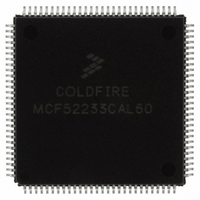MCF52233CAL60 Freescale Semiconductor, MCF52233CAL60 Datasheet - Page 26

MCF52233CAL60
Manufacturer Part Number
MCF52233CAL60
Description
IC MCU 256K FLASH 60MHZ 112-LQFP
Manufacturer
Freescale Semiconductor
Series
MCF5223xr
Datasheet
1.MCF52236AF50.pdf
(55 pages)
Specifications of MCF52233CAL60
Core Processor
Coldfire V2
Core Size
32-Bit
Speed
60MHz
Connectivity
Ethernet, I²C, SPI, UART/USART
Peripherals
DMA, LVD, POR, PWM, WDT
Number Of I /o
73
Program Memory Size
256KB (256K x 8)
Program Memory Type
FLASH
Ram Size
32K x 8
Voltage - Supply (vcc/vdd)
3 V ~ 3.6 V
Data Converters
A/D 8x12b
Oscillator Type
Internal
Operating Temperature
-40°C ~ 85°C
Package / Case
112-LQFP
Cpu Family
MCF5223x
Device Core
ColdFire
Device Core Size
32b
Frequency (max)
60MHz
Interface Type
I2C/QSPI/UART
Total Internal Ram Size
32KB
# I/os (max)
56
Number Of Timers - General Purpose
10
Operating Supply Voltage (typ)
3.3V
Operating Supply Voltage (max)
3.6V
Operating Supply Voltage (min)
3V
On-chip Adc
8-chx12-bit
Instruction Set Architecture
RISC
Operating Temp Range
-40C to 85C
Operating Temperature Classification
Industrial
Mounting
Surface Mount
Pin Count
112
Package Type
LQFP
Processor Series
MCF522x
Core
ColdFire V2
Data Bus Width
32 bit
Data Ram Size
32 KB
Maximum Clock Frequency
60 MHz
Number Of Programmable I/os
56
Number Of Timers
10
Maximum Operating Temperature
+ 85 C
Mounting Style
SMD/SMT
3rd Party Development Tools
JLINK-CF-BDM26, EWCF
Development Tools By Supplier
M52235EVB, M52233DEMO
Minimum Operating Temperature
- 40 C
Package
112LQFP
Family Name
MCF5223x
Maximum Speed
60 MHz
Operating Supply Voltage
3.3 V
For Use With
M52233DEMO - BOARD DEMO FOR MCF52233
Lead Free Status / RoHS Status
Lead free / RoHS Compliant
Eeprom Size
-
Lead Free Status / Rohs Status
Compliant
Available stocks
Company
Part Number
Manufacturer
Quantity
Price
Company:
Part Number:
MCF52233CAL60
Manufacturer:
FREESCAL
Quantity:
1 000
Company:
Part Number:
MCF52233CAL60
Manufacturer:
Freescale Semiconductor
Quantity:
10 000
MCF52235 Family Configurations
26
Processor Status Clock
All Processor Status
Development Serial
Development Serial
Development Serial
Test Data Output
Processor Status
Signal Name
Debug Data
Breakpoint
Outputs
Outputs
Output
Clock
Input
Abbreviation
DDATA[3:0]
PSTCLK
PST[3:0]
ALLPST
DSCLK
MCF52235 ColdFire Microcontroller Data Sheet, Rev. 10
BKPT
TDO
DSO
DSI
Table 16. Debug Support Signals (continued)
Serial output for test instructions and data. TDO is tri-stateable and is
actively driven in the shift-IR and shift-DR controller states. TDO
changes on the falling edge of TCLK.
Development Serial Clock. Internally synchronized input. (The logic
level on DSCLK is validated if it has the same value on two
consecutive rising bus clock edges.) Clocks the serial communication
port to the debug module during packet transfers. Maximum frequency
is PSTCLK/5. At the synchronized rising edge of DSCLK, the data
input on DSI is sampled and DSO changes state.
Breakpoint. Input used to request a manual breakpoint. Assertion of
BKPT puts the processor into a halted state after the current
instruction completes. Halt status is reflected on processor status
signals (PST[3:0]) as the value 0xF. If CSR[BKD] is set (disabling
normal BKPT functionality), asserting BKPT generates a debug
interrupt exception in the processor.
Development Serial Input. Internally synchronized input that provides
data input for the serial communication port to the debug module after
the DSCLK has been seen as high (logic 1).
Development Serial Output. Provides serial output communication for
debug module responses. DSO is registered internally. The output is
delayed from the validation of DSCLK high.
Display captured processor data and breakpoint status. The CLKOUT
signal can be used by the development system to know when to
sample DDATA[3:0].
Processor Status Clock. Delayed version of the processor clock. Its
rising edge appears in the center of valid PST and DDATA output.
PSTCLK indicates when the development system should sample PST
and DDATA values.
If real-time trace is not used, setting CSR[PCD] keeps PSTCLK, PST,
and DDATA outputs from toggling without disabling triggers.
Non-quiescent operation can be re-enabled by clearing CSR[PCD],
although the external development systems must resynchronize with
the PST and DDATA outputs.
PSTCLK starts clocking only when the first non-zero PST value (0xC,
0xD, or 0xF) occurs during system reset exception processing.
Indicate core status. Debug mode timing is synchronous with the
processor clock; status is unrelated to the current bus transfer. The
CLKOUT signal can be used by the development system to know
when to sample PST[3:0].
Logical AND of PST[3:0]
Function
Freescale Semiconductor
I/O
O
O
O
O
O
O
I
I
I











